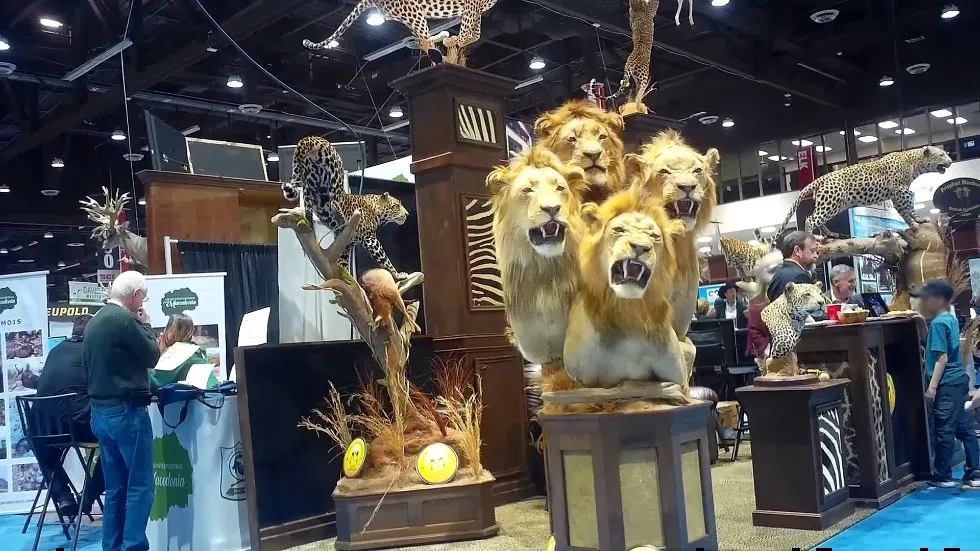A new undercover investigation conducted by the Humane Society of the United States (HSUS) and Humane Society International (HSI) has unveiled shocking hypocrisy within the trophy hunting industry. The investigation, which took place at the Safari Club International (SCI) convention held in Nashville, Tennessee, from February 22 to 25, 2024, exposes a disturbing pattern of deceit and unethical practices designed to promote the killing of endangered and imperiled species.
A Convergence of Trophy Hunts and Exotic Products
The SCI convention, which attracted over 850 exhibitors from more than 140 countries, was a hub for promoting trophy hunts and selling products made from animal skins and claws. The event, which generated approximately $6 million in revenue for SCI, further supports lobbying efforts aimed at undermining laws and regulations designed to protect vulnerable species, including those protected under the Endangered Species Act.
The investigation revealed that trophy hunts were available in at least 65 countries, with a significant concentration in South Africa, Canada, Namibia, Zimbabwe, and New Zealand. Exhibitors offered a range of hunts targeting elephants, leopards, lions, giraffes, hippos, and rhinos. Notably, critically endangered species like the forest elephant and black rhino were also advertised for hunting, alongside captive-bred animals such as the scimitar oryx, which is considered extinct in the wild.
Revealing Violations and Unethical Practices
Among the most startling findings were hunts priced between $2,500 and $143,000, with options to “add-on” additional animals to the primary hunt. The practice of baiting, where carcasses of other animals are used to lure target species, was prevalent. This method not only violates fair chase ethics but also disrupts conservation efforts by drawing animals out of protected areas.
A recorded conversation with an exhibitor highlighted the industry’s callous approach towards endangered species. The exhibitor encouraged the investigator to book a white rhino hunt quickly, stating: “The one that’s gonna be closed down the soonest to import to the United States because of the numbers going down is the rhino… and if you want something Africa[n], you have to get the rhino as soon as possible.”
Ethical Breaches and Legal Violations
The investigation also uncovered multiple instances of vendors flaunting convention rules and state laws. One exhibitor violated the convention’s policy against promoting captive lion hunts, a practice condemned by both the South African and U.S. governments. The vendor claimed, “You can hunt…captive bred lions in South Africa, cause this way you’re not impacting the wild lions…but they…catch their own animals; they’re as wild as can be.” Additionally, another vendor admitted to bending the rules by allowing hunters with mobility issues to hunt from vehicles, a practice illegal in many areas due to safety and ethical concerns.
Luxury items made from endangered species were also on offer, including elephant skin luggage sets priced between $10,000 and $18,000 and jewelry made from leopard claws. Both African elephants and leopards are listed under the Endangered Species Act. Additionally, vendors displayed or sold items made from imperiled species, potentially violating state laws, such as Tennessee’s prohibition on the commercial use of federally endangered species.
Calls for Action
Kitty Block, president and CEO of the Humane Society of the United States, stated: “Despite the public’s growing disdain for trophy hunting, Safari Club International’s convention celebrates the senseless killing of animals, putting their deaths up for sale around the world, all to be turned into nothing more than trinkets and stuffed trophies. Make no mistake: This is an industry that threatens our most imperiled and ecologically important wildlife. As one of the world’s largest consumers of hunting trophies of imperiled species, the United States government has the responsibility to end hunting trophy imports.”
Jeff Flocken, president of Humane Society International, added: “Iconic species like elephants, rhinos, and leopards play critical roles in their respective ecosystems, with many other species dependent on the delicate balance they provide. Sadly, these same animals are also highly coveted by trophy hunters. And as they often target the largest individuals of a species, they weaken the gene pool and can even cause collapses of small populations. In the midst of this biodiversity crisis in which over one million species face extinction, the global community must strive to protect wild animals by eschewing cruel practices like trophy hunting.”
Sara Amundson, president of the Humane Society Legislative Fund, concluded: “Trophy hunting is an archaic and abhorrent practice that we must no longer tolerate. It is unthinkable that endangered and threatened species are killed just to have their parts put out on display. Congress has been urging the U.S. Fish and Wildlife Service to look into its trophy import program for years and this convention is another reminder that the Biden administration must take a hard look at trophies coming into the U.S. so that species are not further pushed to the brink of extinction. We must continue to fight to end this egregious display of blatant disregard for the future of these imperiled species.”


